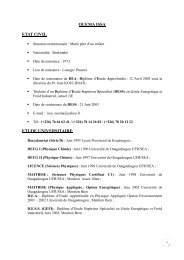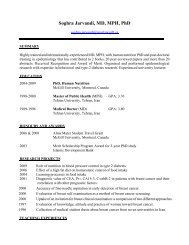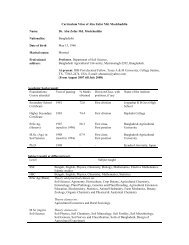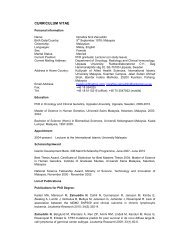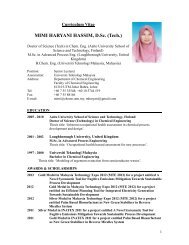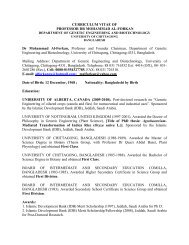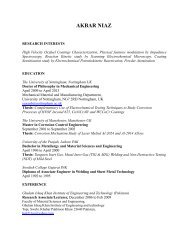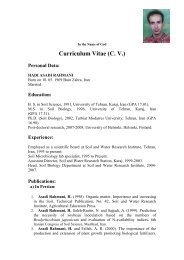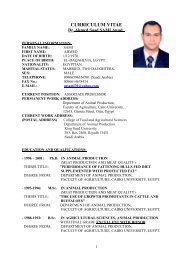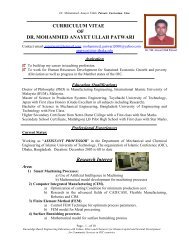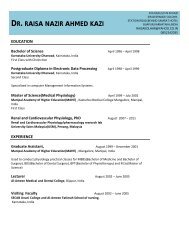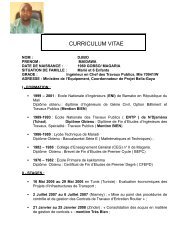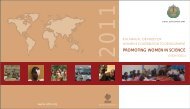Engineering: issues, challenges and opportunities for development ...
Engineering: issues, challenges and opportunities for development ...
Engineering: issues, challenges and opportunities for development ...
You also want an ePaper? Increase the reach of your titles
YUMPU automatically turns print PDFs into web optimized ePapers that Google loves.
ENGINEERING: ISSUES CHALLENGES AND OPPORTUNITIES FOR DEVELOPMENTHowever, a lack of resources is again impeding the speed at whichthe world faces up to these urgent environmental problems. Andagain, a comparison with military spending is a useful reminderof the resources which could be made available. For example, theInstitute <strong>for</strong> Policy Studies recently published a report comparingthe United States government budget allocated to ‘militarysecurity’ with that allocated to ‘climate security’. It found thatthe military budget was 88 times the size of that devoted to tacklingthe climate problem. 31 The UK organization, Scientists <strong>for</strong>Global Responsibility, carried out a similar comparison, this timebetween the government R&D budgets of the world’s wealthiestcountries. They found a very similar imbalance between military<strong>and</strong> renewable energy R&D spending. 32Is the engineering profession doing enough?Given such disturbing facts, it is worth asking whether the engineeringprofession is doing enough to fulfil its obligations interms of social responsibility. As entries in this Report show,there is a great deal of positive activity across the profession,but there remain areas where there is a need <strong>for</strong> improvement.The most obvious example is arguably the close relationshipbetween the engineering profession <strong>and</strong> the military. Giventhe controversies discussed above, related to military technologies<strong>and</strong> the size of military budgets, one might expectto hear more criticism from within the profession about howits skills are deployed. Yet it is very hard to find cases of, <strong>for</strong>example, professional engineering institutions criticizing thegovernment policies that cause such problems.For example, during the recent debate in the UK over proposalsto replace the Trident nuclear weapons system – proposalscriticized by the then UN Secretary General 33 – the maincomment from the Royal Academy of <strong>Engineering</strong> (RAE) 34 wassimply that there needed to be sufficient investment in skills<strong>and</strong> infrastructure to ensure timely delivery of the US$40 billionproject. Such a muted response sits uncom<strong>for</strong>tably withthe RAE’s recently launched ‘Statement of ethical principles’which encourages engineers to have ‘respect <strong>for</strong> life… <strong>and</strong> thepublic good.’ 35Indeed, with the active encouragement of UNESCO, professionalengineering <strong>and</strong> scientific institutions have in recent31 Pemberton, M. 2008. The budgets compared: military vs climate security. Institute <strong>for</strong>Policy Studies. http://www.ips-dc.org/getfile.php?id=131 (Accessed: 4 May 2010).32 Parkinson, S. <strong>and</strong> Langley, C. 2008. Military R&D 85 times larger than renewable energyR&D. SGR Newsletter, No. 35, pp.1. http://www.sgr.org.uk/33 Annan, K. 2006. Lecture at Princeton University. 28 November 2006. http://www.un.org/News/Press/docs/2006/sgsm10767.doc.htm (Accessed: 4 May 2010).34 RAE. 2006. Response to The Future of the Strategic Nuclear Deterrent: the UK manufacturing<strong>and</strong> skills base. http://www.raeng.org.uk/policy/responses/pdf/Nuclear_Deterrent_Consultation.pdf(Accessed: 4 May 2010).35 RAE. 2007. Statement of ethical principles. http://www.raeng.org.uk/policy/ ethics/principles.htm(Accessed: 4 May 2010).years begun to adopt <strong>and</strong> promote ethical codes <strong>for</strong> the profession,which highlight the importance of principles suchas social justice <strong>and</strong> environmental sustainability. Yet, whenthere are clear conflicts between these goals <strong>and</strong> the military<strong>and</strong> commercial interests, which are so intertwined with theengineering profession, the principles seem quickly to be compromised.St<strong>and</strong>ing up <strong>for</strong> social responsibilityOver the years there have been a number of engineering <strong>and</strong>science organizations which have, in frustration with governments<strong>and</strong> professional institutions, tried to promote greatersocial responsibility within the science <strong>and</strong> technology arenas.In 1957, the Pugwash Conferences on Science <strong>and</strong> WorldAffairs was <strong>for</strong>med in response the early nuclear arms race. 36These conferences – which continue today – bring togetherscientists, engineers <strong>and</strong> others from across the world to discusssolutions to global problems. These discussions have beenimportant in sowing the seeds of major arms control treaties.A more radical organization, the International Network <strong>for</strong>Engineers <strong>and</strong> Scientists <strong>for</strong> Global Responsibility (INES), wasset up in 1991 arguing that the professions should play a muchgreater role in supporting peace, social justice <strong>and</strong> environmentalsustainability. 37 It has over seventy member organizationsin more than thirty countries.Influential individuals from the engineering <strong>and</strong> scientificcommunities have also spoken out urging the professions toadopt a more radical position. For example, in 1995 <strong>for</strong>merManhattan Project scientists, Prof. Hans Bethe <strong>and</strong> Prof. JosephRotblat called on all engineers <strong>and</strong> scientists to refuse to workon nuclear weapons projects. 38 More recently, Jayantha Dhanapala,a <strong>for</strong>mer UN Under-Secretary General <strong>and</strong> currentlyChair of the UN University Council, called on engineers <strong>and</strong>scientists (among others) to refuse to work <strong>for</strong> the world’s toptwenty-five military corporations, until the ‘disarmament <strong>for</strong><strong>development</strong>’ agenda is seriously acted upon. 39Becoming an active member of, or otherwise engaging with,one or more of the engineering campaigning groups or nongovernmentalorganizations would be an important contributionto the social responsibility agenda <strong>for</strong> any engineer, <strong>and</strong> itshould be recognized as such in career <strong>and</strong> professional <strong>development</strong>schemes.36 Pugwash Conference on Science <strong>and</strong> World Affairs. http://www.pugwash.org/37 International Network <strong>for</strong> Engineers <strong>and</strong> Scientists <strong>for</strong> Global Responsibility (INES).http://www.inesglobal.com/38 Rotblat, J. 1995. Remember your humanity. Nobel lecture, Oslo. December 10. In:Braun et al (2007). Joseph Rotblat: Visionary <strong>for</strong> peace. Wiley-VCH, Weinheim, Germany.pp. 315–322.39 Dhanapala, J. 2007 (See footnote 25).46



